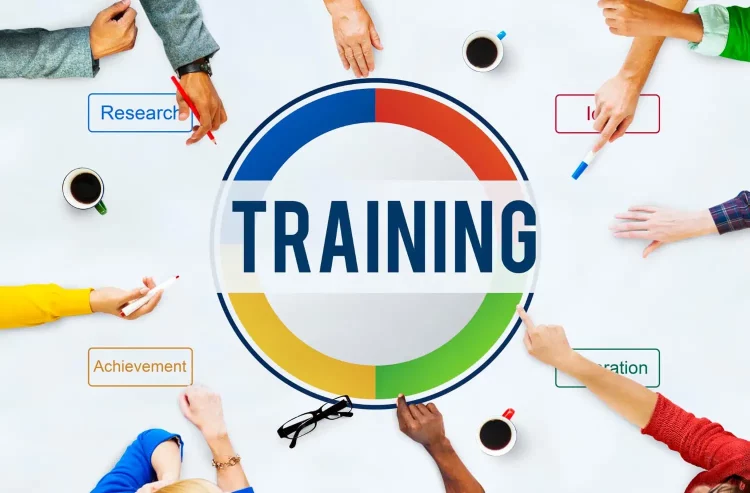In the ever-changing landscapes of various industries, businesses cannot afford to not have a powerful workforce. Even the most talented employees stop bringing value to a company if their skills and knowledge are not consistently updated as per industry trends and requirements. This is where the role of a corporate trainer comes into play.
Corporate trainers ensure that businesses and their employees stay competitive when it comes to skills upgradation. How? Let’s understand in detail.
Who Is A Corporate Trainer?

A corporate trainer is a professional who is responsible for developing and delivering training programs within an organisation. They are typically employed by companies or create their own brand to provide training and development to employees, executives, and other stakeholders.
Corporate training includes designing and delivering training programs that help employees acquire new skills, knowledge, and competencies, and to enhance their overall job performance. These programs may cover a range of topics, including leadership development, team building, communication skills, corporate etiquette, and many others.
Roles & Responsibilities of a Corporate Trainer
Here are some of the specific duties of a corporate trainer:

Planning
Corporate trainers are responsible for creating and developing training programs that align with the organisation’s goals and objectives. They need to assess the training needs of employees, identify skill gaps, and develop training modules accordingly.
Training
Corporate trainers must be able to deliver training programs effectively, using a range of techniques, such as classroom instruction, online learning, or one-on-one coaching.
Organising
Corporate trainer jobs require working closely with other departments and stakeholders within the organisation to ensure that training programs align with the company’s goals and objectives.
Assessment
A corporate trainer is responsible for evaluating the effectiveness of training programs and making adjustments as needed.
Types of Corporate Trainers

Generic Trainers
Generic corporate trainers may work as independent contractors or be employed by training and development firms, human resources departments, or consulting companies for short-term projects.
Niche Trainers
Niche corporate trainers can provide highly customized training programs that address the unique challenges and opportunities of a particular industry or profession. They may also be able to offer insights and best practices that are specific to that industry.
Personality Development Trainer
A personality development trainer works with people to help them enhance their overall personality, which includes improving communication skills, boosting confidence, developing leadership qualities, and increasing self-awareness.
Soft Skill Trainer
A soft skill trainer provides training to individuals and teams to help them develop the soft skills required in professional spaces, such as interpersonal skills, communication skills, teamwork, leadership, problem-solving, critical thinking, and time management.
Know more about ICBI’s Soft Skill Training Courses!
Software Trainer
A software corporate trainer is typically hired to train employees on how to use various software programs that are critical to the company’s operations.
Knowledge Building Trainer
A knowledge building trainer trains teams on building in-depth knowledge in a particular field or area of interest, promoting lifelong learning and expertise on a certain subject.
Skills and Qualities Required to Become a Corporate Trainer

Here are the primary skills that you would require to start finessing if you have chosen to become a corporate trainer:
- Subject Knowledge
- Public Speaking
- Training Management
- Training Program Development
- Training Skills
- English Language
- Oral / Verbal Communication
If you are naturally drawn towards this career option and are confident, a good speaker, and an ambitious person, you can establish yourself as a professional with a globally recognised corporate trainer certification.
How to Become a Corporate Trainer?

Here are the main steps that you need to take to become a certified corporate trainer in India:
1. Identify the Ideal Role and Industry
As we discussed above, corporate trainers have different roles. To select your niche and ideal industry, you must be aware of the skills each requires and your knowledge to keep up with the changing trends. So, explore different options and find out what makes the best choice both professionally and economically.
2. Perform Position-Specific Research
Once you have identified the training field you wish to join, you can start looking deeply into the responsibilities associated with your desired roles. For example, you can learn about job-specific tasks, curriculum, stakeholders involved, session efficacy standards, and the like. This can help build up the necessary skills required for the job.
3. Earn a Bachelor’s Degree
Corporate trainers typically hold a bachelor’s degree in a relevant field such as education, communication, human resources, or business. Some corporate trainers may also hold a master’s degree in a related field. But a Bachelor’s degree is usually a minimum requirement for a relevant trainer role.
4. Complete Corporate Trainer Certification
Corporate training certification adds huge credibility to your name as a trainer. If your training institution certifies students in association with global organisations, it will undoubtedly give you an edge over your competitors.
For example, ICBI’s comprehensive corporate trainer certification program trains students on 16 soft skills training modules and awards them certificates accredited by SQA for Soft Skills Training and National Accreditation Board for Education (NABET). You must also consider offerings like business enablement support and campus placements.
5. Understand Industry Challenges
Trainers must learn how to cope with various industry challenges like limited resources allocated to training and development, limited training time availability, diverse workforce, resistance to change, and technological limitations. You can talk to mentors and also learn about solutions during your corporate trainer course.
6. Apply for Jobs
Once you feel prepared to step into the corporate training arena, start looking for jobs. A bachelor’s degree can help you get started, and at the same time, a corporate trainer certification can give you a competitive edge as well as the credibility required in this field.
7. Continue Professional Development
Consider gaining experience as a trainer by volunteering or teaching in a community setting or within your current organisation. Building relationships with industry professionals and attending industry conferences and events can also help you stay up-to-date on the latest trends and best practices in corporate training.
Career Options for Corporate Trainers

Some of the top career options for corporate trainers include:
- Customer service trainers
- E-learning developers
- Human resources managers
- Instructional designers
- Leadership trainers
- Learning and development specialists
- Organizational development specialists
- Sales trainers
- Technical trainers
- Training and development managers
There is a whole world of opportunities as a certified soft skills trainer, and a corporate trainer role is simply one of the many career fields that you can choose from. So, begin with finding out what kind of soft skills trainer jobs best complement your interests and career goals and then create a sure-fire career plan.

